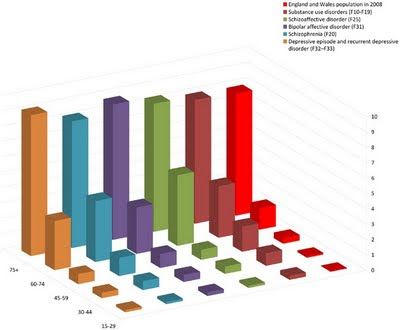Neuroscience

Today is the Mental Health Blog Party sponsored by the American Psychological Association as part of Mental Health Month. A widely neglected part of mental health treatment is encouraging and maintaining good physical health. This is extremely difficult when some of the major drugs prescribed for serious mental illnesses (such as schizophrenia and bipolar disorder) produce substantial weight gain. The "second generation" or atypical antipsychotics can cause obesity and hence diabetes, hypertension, cardiovascular problems, high cholesterol, and stroke.
Yesterday the BBC posted this headline:
click on image for a larger view

Figure 1 (Chang et al., 2011). Annual mortality risk (%) by age groups and diagnoses of mental illness, compared to England and Wales population in 2008.
The figure above illustrates the 2008 population of England and Wales in the red bars for five different age group: 15-29, 30-44, 45-59, 60-74, and 75+. Those with substance use disorders are shown in maroon, schizoaffective disorder in green, bipolar disorder in purple, schizophrenia in aqua, and depression/recurrent depression in light brown.
Mortality risk is increased for all psychiatric diagnoses, and is especially evident in the middle three age groups. Life expectancies were estimated using these data, and the results
Why might this be? The authors do not speculate beyond stating that the "underlying causes may be multiple." Certainly, one can imagine that medication-induced weight gain [and increased levels of smoking] among the SMI contributes to lowered life expectancies.
To counteract these dismal statistics, a regular part of mental health treatment should include programs that promote better physical health. Smoking cessation and nutritionists and structured exercise classes in addition to standard psychiatric care and substance abuse treatment.
A six month intervention pilot study in Maryland enrolled 63 overweight participants at psychiatric rehabilitation day programs (Daumit et al., 2010):
References
Chang, C., Hayes, R., Perera, G., Broadbent, M., Fernandes, A., Lee, W., Hotopf, M., & Stewart, R. (2011). Life Expectancy at Birth for People with Serious Mental Illness and Other Major Disorders from a Secondary Mental Health Care Case Register in London PLoS ONE, 6 (5) DOI: 10.1371/journal.pone.0019590
Daumit, G., Dalcin, A., Jerome, G., Young, D., Charleston, J., Crum, R., Anthony, C., Hayes, J., McCarron, P., Khaykin, E., & Appel, L. (2010). A behavioral weight-loss intervention for persons with serious mental illness in psychiatric rehabilitation centers International Journal of Obesity DOI: 10.1038/ijo.2010.224
- Are Mental Disorders Real?
How do the public view mental disorders? Do they see them as real entities with some kind of essence, or do they see them as the invention of human culture? And how does their take differ from that of mental health professionals? To find out, Woo-kyoung...
- Can Pot Smoking Counter The Negative Metabolic Consequences Of Atypical Antipsychotics?
DISCLAIMER: This is a hypothetical question and not a medical recommendation. But it might be an idea worth investigating in epidemiological studies. Everyone knows that pot gives you the munchies. So the paradoxical finding that marijuana use is associated...
- Fda: Saphris (asenapine) Approval, Schizophrenia And Bipolar
From the FDA: FDA Approves Saphris to Treat Schizophrenia and Bipolar Disorder The U.S. Food and Drug Administration has approved Saphris tablets (asenapine) to treat adults with schizophrenia, a chronic, severe and disabling brain disorder, and to treat...
- Johns Hopkins Master Of Health Science In Mental Health Degree!
The Johns Hopkins Bloomberg School of Public Health, Department of Mental Health invites applications for the Master of Health Science degree program for the 2016/2017 academic year (due June 1, 2016). https://drive.google.com/file/d/0B-WK1jWUo8h2YTNZUzZRSGdjM28/view?usp=sharing...
- Neuroscience And Cognitive Science (nacs) Colloquium Series
Speaker: Dr. Thomas Insel, NIMH, NIH (RIVAS MEMORIAL LECTURER) Title: "Rethinking Mental Illness" Date: April 15 Time: 10:15am Place: 1103 Bioscience Research Building (BRB) Coffee & cookies outside of 1103 BRB at 10:00am. Host: Dr. Nathan Fox Abstract:...
Neuroscience
Improving the Physical Health of People With Serious Mental Illness

Today is the Mental Health Blog Party sponsored by the American Psychological Association as part of Mental Health Month. A widely neglected part of mental health treatment is encouraging and maintaining good physical health. This is extremely difficult when some of the major drugs prescribed for serious mental illnesses (such as schizophrenia and bipolar disorder) produce substantial weight gain. The "second generation" or atypical antipsychotics can cause obesity and hence diabetes, hypertension, cardiovascular problems, high cholesterol, and stroke.
Yesterday the BBC posted this headline:
Mentally ill have reduced life expectancy, study findsBy Dominic Hughes Health correspondent, BBC NewsThe BBC article referred to a paper that was published today in PLoS ONE (Chang et al., 2011). The authors reviewed the electronic database of a major mental health care provider (the South London and Maudsley NHS Foundation Trust). The results were alarming (but not new, unfortunately):
People suffering from serious mental illnesses like schizophrenia or bipolar disorder can have a life expectancy 10 to 15 years lower than the UK average.Researchers tracked the lives of more than 30,000 patients through the use of electronic medical records.They found that many were dying early from heart attack, stroke and cancer rather than suicide or violence.Mental health groups say vulnerable people need to be offered better care to prevent premature deaths.. . . "We need to improve the general health of people suffering from mental disorders by making sure they have access to healthcare of the same standard, quality and range as other people, and by developing effective screening programmes."
A total of 31,719 eligible people, aged 15 years or older, with SMI [serious mental illness] were analyzed. Among them, 1,370 died during 2007–09. Compared to national figures, all disorders were associated with substantially lower life expectancy: 8.0 to 14.6 life years lost for men and 9.8 to 17.5 life years lost for women. Highest reductions were found for men with schizophrenia (14.6 years lost) and women with schizoaffective disorders (17.5 years lost).
click on image for a larger view
Figure 1 (Chang et al., 2011). Annual mortality risk (%) by age groups and diagnoses of mental illness, compared to England and Wales population in 2008.
The figure above illustrates the 2008 population of England and Wales in the red bars for five different age group: 15-29, 30-44, 45-59, 60-74, and 75+. Those with substance use disorders are shown in maroon, schizoaffective disorder in green, bipolar disorder in purple, schizophrenia in aqua, and depression/recurrent depression in light brown.
Mortality risk is increased for all psychiatric diagnoses, and is especially evident in the middle three age groups. Life expectancies were estimated using these data, and the results
confirmed substantially shortened life expectancies at birth for all serious mental disorder groups investigated compared to national norms. Largest reductions were found for men with schizophrenia, women with schizoaffective disorders, and both men and women with substance use disorders.
Why might this be? The authors do not speculate beyond stating that the "underlying causes may be multiple." Certainly, one can imagine that medication-induced weight gain [and increased levels of smoking] among the SMI contributes to lowered life expectancies.
To counteract these dismal statistics, a regular part of mental health treatment should include programs that promote better physical health. Smoking cessation and nutritionists and structured exercise classes in addition to standard psychiatric care and substance abuse treatment.
A six month intervention pilot study in Maryland enrolled 63 overweight participants at psychiatric rehabilitation day programs (Daumit et al., 2010):
Results: ... In total, 52 (82%) completed the study; others were discharged from psychiatric centers before completion of the study. Average attendance across all weight management sessions was 70% (87% on days participants attended the center) and 59% for physical activity classes (74% on days participants attended the center). From a baseline mean of 210.9 lbs (s.d. 43.9), average weight loss for 52 participants was 4.5 lb (s.d. 12.8) (P<0.014). On average, participants lost 1.9% of body weight. Mean waist circumference change was 3.1 cm (s.d. 5.6). Participants on average increased the distance on the 6-minute walk test by 8%.Conclusion: This pilot study documents the feasibility and preliminary efficacy of a behavioral weight-loss intervention in adults with serious mental illness who were attendees at psychiatric rehabilitation centers...Although a 2% loss of body weight may not seem like much, it's better than a 10% weight gain over the same time period. The medical profession is obligated to provide the means for improved physical health in persons with serious mental illnesses. When physical health is potentially compromised by psychiatric treatments such as atypical antipsychotics, action to improve the situation is even more urgent.
References
Chang, C., Hayes, R., Perera, G., Broadbent, M., Fernandes, A., Lee, W., Hotopf, M., & Stewart, R. (2011). Life Expectancy at Birth for People with Serious Mental Illness and Other Major Disorders from a Secondary Mental Health Care Case Register in London PLoS ONE, 6 (5) DOI: 10.1371/journal.pone.0019590
Daumit, G., Dalcin, A., Jerome, G., Young, D., Charleston, J., Crum, R., Anthony, C., Hayes, J., McCarron, P., Khaykin, E., & Appel, L. (2010). A behavioral weight-loss intervention for persons with serious mental illness in psychiatric rehabilitation centers International Journal of Obesity DOI: 10.1038/ijo.2010.224
- Are Mental Disorders Real?
How do the public view mental disorders? Do they see them as real entities with some kind of essence, or do they see them as the invention of human culture? And how does their take differ from that of mental health professionals? To find out, Woo-kyoung...
- Can Pot Smoking Counter The Negative Metabolic Consequences Of Atypical Antipsychotics?
DISCLAIMER: This is a hypothetical question and not a medical recommendation. But it might be an idea worth investigating in epidemiological studies. Everyone knows that pot gives you the munchies. So the paradoxical finding that marijuana use is associated...
- Fda: Saphris (asenapine) Approval, Schizophrenia And Bipolar
From the FDA: FDA Approves Saphris to Treat Schizophrenia and Bipolar Disorder The U.S. Food and Drug Administration has approved Saphris tablets (asenapine) to treat adults with schizophrenia, a chronic, severe and disabling brain disorder, and to treat...
- Johns Hopkins Master Of Health Science In Mental Health Degree!
The Johns Hopkins Bloomberg School of Public Health, Department of Mental Health invites applications for the Master of Health Science degree program for the 2016/2017 academic year (due June 1, 2016). https://drive.google.com/file/d/0B-WK1jWUo8h2YTNZUzZRSGdjM28/view?usp=sharing...
- Neuroscience And Cognitive Science (nacs) Colloquium Series
Speaker: Dr. Thomas Insel, NIMH, NIH (RIVAS MEMORIAL LECTURER) Title: "Rethinking Mental Illness" Date: April 15 Time: 10:15am Place: 1103 Bioscience Research Building (BRB) Coffee & cookies outside of 1103 BRB at 10:00am. Host: Dr. Nathan Fox Abstract:...
